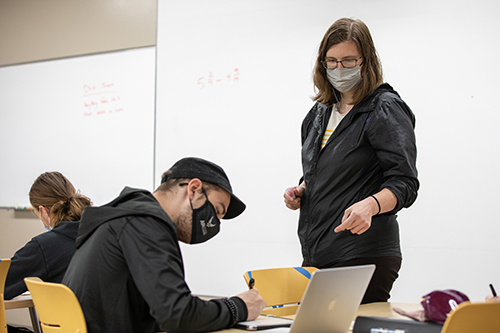Weber State Secures $1 Million NSF Grant to Help Recruit Math and Science Teachers
OGDEN, Utah – A new Weber State University program to recruit, develop and retain highly qualified high-school mathematics and science teachers has received a $1 million grant from the National Science Foundation.
The College of Science and the Moyes College of Education have partnered on the program, hoping to increase the interest in teaching opportunities among traditional STEM (science, technology, engineering, math) undergraduates.
 The Weber State Mathematics and Science Teacher Propel project will provide 18 two-year scholarships to students pursuing math or science degrees, so they can secure teaching credentials and commit to teaching in high-need school districts. Weber State students will receive a $3,600 annual salary supplement in their first year and will be supported by and work closely with mentors, both teachers in local math and science classrooms and with WSU STEM faculty. These efforts will aid in both recruiting and retaining highly qualified STEM teachers in northern Utah, the proposal said.
The Weber State Mathematics and Science Teacher Propel project will provide 18 two-year scholarships to students pursuing math or science degrees, so they can secure teaching credentials and commit to teaching in high-need school districts. Weber State students will receive a $3,600 annual salary supplement in their first year and will be supported by and work closely with mentors, both teachers in local math and science classrooms and with WSU STEM faculty. These efforts will aid in both recruiting and retaining highly qualified STEM teachers in northern Utah, the proposal said.
The program also offers numerous internships to STEM majors interested in teaching where these students can interact with middle and high school students as well as master teachers in the area. Propel graduates will commit to teaching in high-needs classrooms.
Associate professor of mathematics education Rachel Bachman is the principal investigator for the project. While Weber State graduates 25 math and science secondary teachers each year, she said, the Ogden, Weber and Davis School Districts collective demand 78 such teachers annually.
“This project will increase the number of mathematics and science teachers available to the districts in the WSU service area while also building institutional infrastructure for future recruitment of mathematics and science teachers,” Bachman said.
The Propel program is expected to begin fall semester 2021.
Adam Johnston, director of the College of Science’s Center for Science and Mathematics Education, said the National Science Foundation grant is a “big deal” and that the college is excited for the funds to support students’ careers in teaching.
“The big outcome will be to help spark some of our traditional science and math majors to try out teaching and increase the number of people going into classrooms,” he said. “But I think more of our students will get experience with education through tutoring and classroom experiences that will expand their ideas and expertise in education.”
Moyes College Master of Education director Louise Moulding said the grant funding has the potential to attract students who have a deep commitment to being in the classroom.
“The greatest impact will be felt in the secondary education program as we attract and prepare, in a more integrated way, students who can fulfill a persistent need in our local schools for qualified math and science teachers,” she said.
This is one of the largest grants the College of Science has received from the National Science Foundation in recent years. In 2018, the college received $650,000 for the WEST Scholarship and $320,000 for the GETUP programs.
Andrea Easter-Pilcher, dean of the College of Science, praised the hard work and innovative vision of Bachman, Johnston, Moulding, and microbiology professor Michele Culumber for their contributions to the Propel project.
“Upon recognizing a critical need for additional well-trained science and mathematics educators in our community, these faculty members dedicated an extraordinary amount of effort, time and tenacity to secure this highly competitive National Science Foundation funding,” she said. “We are extremely proud of their success and excited for the future of science and mathematics in our community.”
Kristin Hadley, dean of the Moyes College, also praised the collaborative work between the two colleges.
“We are now ready to embark on efforts to make an impact on the dire shortage of STEM teachers in Utah and the nation,” Hadley said. “It's a great time to prepare to be a teacher.”
The National Science Foundation funds research and education in most fields of science and engineering through grants and cooperative agreements with more than 2,000 colleges, universities, K-12 school systems, businesses, informal science organizations and other research organizations throughout the United States.
Visit weber.edu/wsutoday for more news about Weber State University.
Jessica Kokesh, social media editor
801-626-7316 • jessicakokesh@weber.edu- Contact:
Rachel Bachman, mathematics associate professor
801-626-7107 • rachelbachman1@weber.eduAdam Johnston, physics professor
801-626-7711 • ajohnston@weber.edu